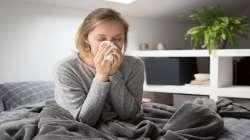H3N2 Influenza Outbreak: Do's and don'ts to protect your children and elderly
Influenza A H3N2 "Seasonal Flu" is an infectious disease that can spread from person to person by droplets from an afflicted person's cough or sneeze, or through contact with droplets on hands and surfaces.

H3N2 Influenza Outbreak: Central government officials have confirmed that the H3N2 subtype of the influenza A virus has claimed nine lives in the country. The H3N2 virus has been identified as the primary cause of an increase in influenza infections across the country.
While influenza is a yearly illness, the current season's weather and lifestyle choices (such as poor personal hygiene, coughing and sneezing in close proximity to others, keeping indoor gatherings in confined spaces, and so on) have aided in the spread of several viral respiratory pathogens, including influenza A (H1N1, H3N2, and other viruses), adenoviruses, and other viruses.
Here are some important do's and don'ts to keep in mind for children and the elderly during the H3N2 influenza season:
Do’s:
Get done with vaccination: The most effective way to prevent H3N2 is to get vaccinated. It's particularly important for children and the elderly to get vaccinated, as they are more likely to develop serious complications if they get sick with the flu.
Wash hands frequently: Make sure to wash your hands frequently with soap and water or use an alcohol-based hand sanitizer. This helps to prevent the spread of germs that cause the flu.
Cover coughs and sneezes: When coughing or sneezing, make sure to cover your mouth and nose with a tissue or elbow to prevent the spreading of germs.
Stay home when sick: If you or your child are sick with the flu, stay home to avoid spreading the virus to others.
Eat healthy and stay hydrated: Eating a healthy diet and staying hydrated can help boost the immune system, making it easier to fight off infections.
Dont’s:
Touch face and mouth: Try to avoid touching your face and mouth, as this can spread germs and increase the risk of getting sick.
Share food and drinks: Sharing food and drinks can spread germs and increase the risk of getting sick.
Ignore symptoms: If you or your child experience flu-like symptoms such as fever, cough, and sore throat, seek medical attention as soon as possible to avoid serious health complications.
By following these do's and don'ts, children and the elderly can stay healthy during the H3N2 influenza season. It's important to take every precaution possible to protect ourselves and those around us from getting sick with the flu.
DON'T MISS
Covid variant XBB 1.16 cases rise in India: Know how to reduce risk amid H3N2 virus outbreak
Will H3N2 virus influenza turn into the next Covid pandemic? Here is what experts say
H3N2 Virus and Covid cases rise: Why is it important to wash hands frequently? Follow these tips
